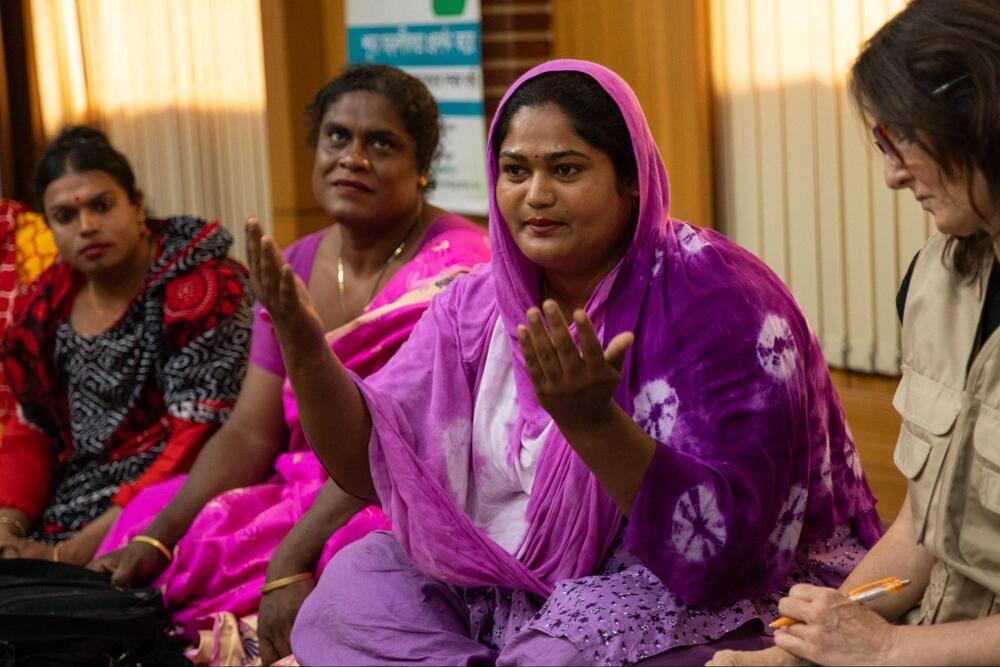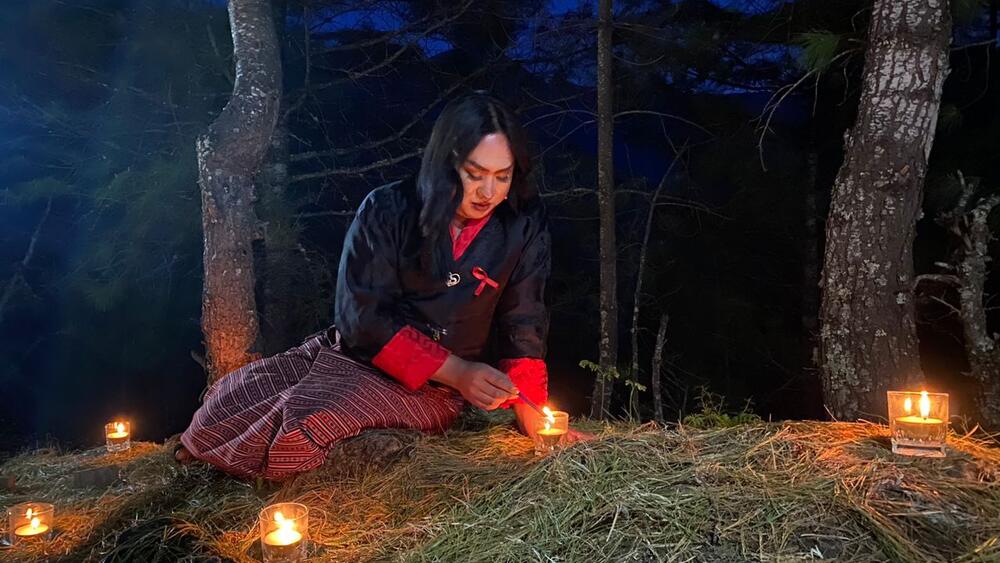News
For the community, by the community: Transgender advocates for sexual and reproductive health and rights
- 17 May 2024
News
MONGARTK, Bhutan/GAIBANDHA, Bangladesh – Around the world, lesbian, gay, bisexual, transgender, queer, intersex and asexual (LGBTQIA+) people are increasingly being accepted by their communities and countries.
Two thirds of governments have decriminalized same-sex sexuality and marriage equality has been approved across three dozen countries, marking a strong departure from decades past. And research indicates that more countries eliminated laws restricting LGBTQIA+ rights in 2022 than in any single year in the past quarter century.
Yet discrimination and stigma continue to drive significant disparities for sexual and gender minorities. Research shows LGBTQIA+ people suffer disproportionately from mental health challenges and often struggle to access stigma-free health care that addresses their unique needs. Meanwhile, harassment and assault remain urgent threats: A global review of transgender people’s health experiences, for example, found a median prevalence rate for violence and victimization of 44 per cent.
Members of the LGBTQIA+ community have stepped in to fill gaps in access to health care and put an end to prejudice. Among them are advocates for the rights of trans and gender-diverse people like Mamouni in Bangladesh and Pride Bhutan outreach officer Tshering Tshoki, whose work UNFPA, the United Nations sexual and reproductive health agency, supports on its mission to deliver sexual and reproductive health and rights for all.

Seeking others to support in Bangladesh
“I have faced rejection from my family, my community, my entire society. I could not go to school,” Mamouni told UNFPA Executive Director Dr. Natalia Kanem on her May 2024 visit with LGBTQIA+ people in Bangladesh. “The transgender community accepted me.”
Mamouni lives in a collective household with 14 other hijra, a term used in Bangladesh to describe transgender and gender-diverse people, in the Gaibandha district on the banks of the Brahmaputra River.
Every year, monsoon rains threaten the area with floods, and sometimes force residents to evacuate. For hijra like Mamouni, displacement carries specific risks, as sexual and gender minorities often face discrimination and exclusion from relief and shelter in the aftermath of disasters.
“The last floods were very severe. The water reached our hips,” Mamouni told UNFPA. “I had to sleep on a train line as I had nowhere to go and no support.”
Climate emergencies can exacerbate challenges faced by already-marginalized communities. In anticipation of seasonal floods in 2020, UNFPA supplied hijra across northwestern Bangladesh with financial support and more than 6,000 dignity kits, enabling individuals to prepare for disasters – and to relocate in their aftermath.
“LGBTQIA+ people deserve full enjoyment of their equal rights just like all others,” UNFPA Executive Director Dr. Natalia Kanem said. “Yet despite progress in many parts of the world, they often still suffer from severe discrimination and stigma. This is wrong.
“During conflicts and crises, their rights may be overlooked and their unique needs for protection and health care can go unmet. To truly leave no one behind means safeguarding the rights of LGBTQIA+ people in all settings and including them fully in humanitarian preparedness, response, relief and recovery efforts."
Bangladesh legally recognized a third gender, that of the hijra community, in 2014. Despite these reforms, hijra across Bangladesh are still forced to confront devastating discrimination, violence and inequality: Research suggests an overwhelming majority of transgender people who seek health care encounter harassment, for example.
Across the country in Cox’s Bazar, the Bandhu Social Welfare Society works to ensure sexual and gender minorities are able to access essential health care services.
Transgender 47-year-old Purnima volunteered for the UNFPA-supported programme in 2022, and sought out members of the transgender community at the Kutupalong refugee camp to provide counselling, direct towards medical assistance, coordinate sexual and reproductive health care and offer legal aid.
"Embrace who you are, stand up for what you believe in and make a difference in the lives of others, regardless of the challenges you may face," Purnima said.

Accompanying others towards care in Bhutan
“It was the rebirth of Tshering Tshoki.” This is how the LGBTQIA+ rights advocate and Pride Bhutan outreach worker described her journey towards fully embracing her gender identity.
Ms. Tshoki had always known she was a transwoman, but delayed transitioning due in part to social pressure. Discrimination also drove her to quit school: Her breaking point came after male classmates trapped her in a bathroom and doused her with water. When school officials turned a blind eye, Ms. Tshoki left.
"Education is the key to unlocking potential, and every transgender person deserves the right to access it without fear of discrimination," said Ms. Tshoki. “Ensuring that transgender individuals have equal opportunities in education is essential for building a more inclusive and equitable society."
In Bhutan, despite recent strides towards equality for LGBTQIA+ people, with same-sex relationships decriminalized in 2021, prejudice remains a significant barrier to health, happiness, education and opportunity for the country’s sexual and gender minorities. One recent small-scale survey revealed four in five LGBTQIA+ respondents had experienced discrimination, while nearly all felt their identity remained a taboo topic.
This stigma also affected Ms. Tshoki, whose family initially opposed her decision to transition. Support from transwomen role models abroad, however, helped her proudly embrace her identity, and soon her mother signalled her own acceptance by gifting her daughter gold earrings and a rachu, worn by women in Bhutan.
"Accepting your LGBT child is not about understanding their journey, it's about loving them unconditionally, just as they are,” Ms. Tshoki told UNFPA.
Today, Ms. Tshoki is a leader among the country’s community of transgender women. Her work centres on helping its members achieve good health: “I go with them for check-ups and also see if they're [experiencing] violence and refer [them for support]”, she said in an interview with Queer Voices of Bhutan.
UNFPA helps connect LGBTQIA+ people in Bhutan with sensitive sexual and reproductive health care and information, as well as gender-based violence response services. The agency has also collaborated with the government of Bhutan to update the country’s National Gender Equality Policy so that it covers issues of special urgency to sexual and gender minorities.
“I got into this work to make people understand that transwomen are women,” Ms. Tshoki said. “Every protection meant for women and girls – they deserve it.”